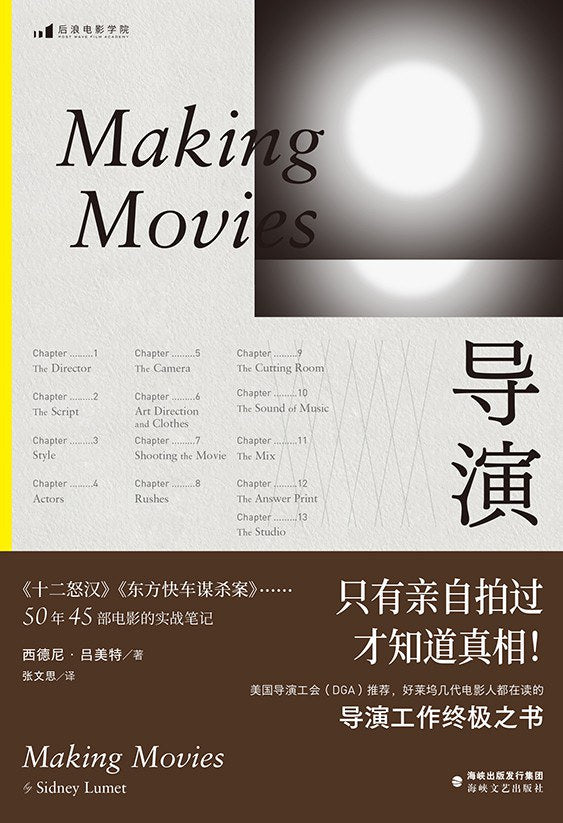WULOLIFE
《导演》作者: [波] 西德尼·吕美特 / 西德尼·吕美特 出版社: 海峡文艺出版社 原作名: Making Movies
《导演》作者: [波] 西德尼·吕美特 / 西德尼·吕美特 出版社: 海峡文艺出版社 原作名: Making Movies
Couldn't load pickup availability
Description
内容简介 · · · · · ·
美国导演工会推荐,好莱坞几代电影人都在读的导演工作终极之书
“他拍出了库布里克没有拍出过的伟大电影”诺兰、斯皮尔伯格等名导深情力荐
《十二怒汉》《东方快车谋杀案》导演、奥斯卡终身成就奖得主,50年45部电影的实战笔记
“只有亲自拍过,才知道真相!”
◎ 编辑推荐
Film导演,积累了上百集电视剧经验后,初闯电影圈即一鸣惊人,凭借《十二怒汉》斩一举跻身好莱坞金字塔尖,以平均每年一部电影的惊人产东方快车谋杀案》《热天午后》《电视台风云》……
在《导演》一书中,这位“视自己为工匠的艺术家”娓娓道来,毫无保留地分享创作经验用尽全力捍卫自己的艺术理想。
本书自1996年初版以来,一直被全世界电影人奉为马逊畅销图书中的Top 1%。诺兰称《蝙蝠侠:黑暗骑士》受到本书及吕美特作品的启发,《黑天鹅》导演达伦·阿罗诺夫斯基将本书列为人生No.1电影书,斯皮尔伯格更盛赞它是电影界“全体的殊荣”。
畅销全球的必读经典,数代好莱坞电影人的启蒙之作
…
干货满满的拍片指南:“一镜到底”,带领我们沉浸式“亲历”电影诞生的历程(含高质量“赶工”与省钱妙招)
保罗·纽曼、凯瑟琳·赫本、马龙·白兰度、阿尔·帕西诺、肖恩·康纳利……在吕美特的职业生涯中,与顶尖演员合作的次数,可能比其他任何导演都多,这些超级明星竟都愿意拿最低片酬拍他的电影他能与演员建立深刻的信任,常令演员有神奇发挥、贡献巅峰表演。本书中,为我们揭开表演的隐秘世界,深情描绘出演员“暴露自我”的勇气,以及导演与演员并肩作战、共渡难关的暖心故事。
打破导演“偏执狂”神话,细数温柔派lead er,如何让剧组上下齐心、相互信任、成就彼此,共同创造伟大作品
● 内容简介
怎样做方能让演员演过无数次后依然情感真挚?要在纽约市中心拍一场枪战,动用上百名群演,数车相撞,究竟如何才能办到? 导演如何在重重压力下,让全剧组上下齐心……
大导演吕美特带我们走进片场,“一镜到底”,记录从第一次排练到杀青的整个过程。这是一部回忆录,其间有艺术家对创作生活的坦诚分享,有与好莱坞大明星(从凯瑟琳·赫本、保罗·纽曼、马龙·白兰度到阿尔·帕西诺)一起奋战片场导演成长指南,不仅提供了清晰高效且可传承的工作方法,更实在道出面对突发状况时来自“老江湖”的经验智慧。
★ 精彩内容摘录
○ 只有电影这种艺术形式,是在用“人”去记录那些大于生活的东西。
○我知道这个世界上还有很多年轻人向或省下自己的零用钱,来买自己的第一台摄影机,他们当中有些人梦想自己能成名、赚大钱。但是仍然有一些人梦想着找到对自己真正重要的东西,梦想着对自己和所有愿意倾听的人说出:“我在乎。”
○他是这样回答的:“如果我尼的工厂; ,二者都不该在这部古装片里出现。”只有那些真正拍电影的人才清楚为什么做出这样的决定,而每个决定都会影响最终拍出一部怎样的作品。
○
○很多法国演总在抱怨编剧短缺。全是因为什么扯淡的“作者论”演如此无所不能了,大多数自尊心强的编剧当然会抗拒参与这样的电影。
○演员所用的“乐器”便是他自己——他的感情、他的面貌、他的性感、他的泪水、他的欢笑、他的愤怒、他的浪漫、他的柔情惬意、他的邪恶气息,这些都会在大银幕上呈现给所有人。这绝非易事,其实,往往还是件痛苦的事。
○我想要的不是被复制在大银幕上的生活。我想要的是经过创造的生活。这两者的区别在于演员暴露自我的程度不同。
○如果说这种暴露自我的做法给保罗·纽曼这样的男演员都造成如此痛苦,那么试想一下这会让女演员多么难过吧。人们不仅要求她们做出同等自我揭露,而且还把她们当作贩售性感的商品来对待。
○演从不会故意挖他们的私人经验,侵犯他们的隐私。有些导演会这么做的。这里没有对与错之分……如果我们不能靠技术拍到我想要的效果,那么就随它去吧。总会找到其他一些同样有效的方法。
○于是演员们渐渐会形成依赖。所有这些都会形成一定的危险。明星们会有一种强大的权力感,而这种甚至可以说毫无意义的东西,会破坏他们的作品。
○ 白兰度会在开拍后的一到两天里暗中测试导演。他的做法就是给你两条表面上看起来一模一样的镜头。唯一的区别是,其中一条他由内心自发地表演;而另一条,他只是象征性地演一下 “这个情绪就是这个样子”。然后他会看你选择了哪一条“过”。如果的那条,他心里就有数了。
○望风格显而易见。是因为他们其实没有真正看到风格。
○ 好的风格不是直接看到的风格,而是感受到的风格。
○没有影评人能认出《城市王子》中风格化的东西——那是我拍过的最风格化的电影之一了。不过,黑泽明认出了。我职业生涯中最激动人心的时刻,那便是黑泽明跟我聊起该片的“摄影机技法之美”与“电影之美”时。
○ 选择越受限、越具体,结果反而会变得越具有普世性。
○对于任何一种创作性的工作来说,自我欺骗都是绝对必要的。创造性的工作非常艰难,仅仅为了开个好头,也有必要在某种程度上自我欺骗。
○ 只有三个人清楚剪辑是好是坏:剪辑师、导演和摄影师。
○商业上的成功跟片子的好坏没有关系。好电影会大卖,好电影也会惨败;烂电事实就是没有人真的知道什么样的电影会赚会赔。
○拍电影的主要内容——战斗。我要为剧本而战,为合适的演员而战,然后还要跟沙漠中心的酷热环境战斗,要战胜疲惫,要克服英国的群众演员规矩。现在我却因为一个白痴广告还要斗下去。
☆ 名人推荐
吕美特拍出了库布里克没有拍出过的伟大电影.的是,他的风格是如此多元,但仍有那种库布里克的内核。
——克里斯托弗·诺兰
如果令每个导演都上一层楼。今天,西德尼 · 吕美特,好莱坞历史上最伟大的导演之一,居然愿意如此真诚地与我全体的殊荣。
——史蒂文·斯皮尔伯格
这本书出版时,我立刻就下单了,精装本,当时我在读电影学院,这对一个学生来说可谓斥巨资(当时穷惨了)。我整个周末都在如饥似渴地读,消化着那些关于《热天午后》和《十二怒汉》的故事。吕美特回顾了自己的职业生涯,惊人地清晰、诚实、精确,有许多关于导演、关于拍电影的智慧。尽管那时我只拍过一些学生作业短片,仍能对他描述的那些挑战产生共鸣,并用上了他教的东西。
——达伦·阿罗诺夫斯基
给喜欢电影的人看,看了就能了解电影是怎么拍出来的,看电影的时候该看什么。就是这本!
——罗杰·伊伯特
每个人都要读一读。
——大卫·波德维尔
西德尼是一位电影大师……他的书就好像他的电影一样——坦诚、真挚、充满活力而且非常非常机智。任何一读。
——大卫·马梅
一位大师写就的电影圣经。它事无巨细地讲述了制作电影每一步的过程。你会感觉恍如置身片场。而这是必须的。
——昆西·琼斯,好莱坞ZUI有影响力的音乐家
◎ 媒体推荐
作为一位艺术家,吕美特在本书中表现出令人钦佩的慷慨,非常乐意把自己的智慧传授给读者——这也赋予了本书极其实用的特质,让它成了电影创作者梦寐以求的理想学习工具。
——美国导演工会
因此他非常乐意分享自己的秘诀。他不仅仅是视觉大师,很大程度上也是个工匠,相信对片场有清晰、高效的控制,让拍摄如行云流水般运转,方让创作团队发挥做到Z UI好。他传递观点时用了非常丰富的镜头例证、流程安排和实用模版。
——纽约电影学院
吕美特在这本书中所写的正是叙事艺术本身的奥义。
——《纽约时报》
精彩绝伦!吕美特这本回忆录同他的作品一样,大气庄重,又能触动人心。
——《洛杉矶时报》
正是因为吕美特说得热忱激昂,且很有主见,而他所谈论的正是那些他有权发表个人意见的东西。
——斯坦利·考夫曼,《新共和》
吕美特写了一本引人入胜的回忆录借此传导他在亲制作品中所体会的乐趣,那是他在电影制作时所得到的巨大的快乐……即便这本书只是简练地介绍了电影是如何由一位经验丰富的匠师拍摄出来,简明易懂,而它对电影制作技术方面的介绍依然非常丰富。
——《巴尔的摩太阳报》
作者简介 · · · · · ·
作者简介:
西德尼·吕美特(Sidney Lumet, 1924—2011, 1924—2011横跨舞台剧、电视、电影领域,其中共拍摄电影作品45部,处女作《十二怒汉》便斩获柏林电影节金熊奖,其他代表作有《东方快车谋杀案》《长夜漫漫2005 年,获颁奥斯卡终身成就奖。曾七次被美国导演工会( DGA) DGA National Arts Club物馆、伦敦英国学院和巴黎的法国博物馆都曾为其举办过电影回顾展。
